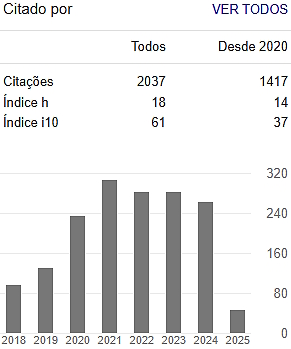PHYSIOLOGICAL QUALITY OF SOYBEAN SEEDS SUBMITTED TO PRE-HARVEST DESICCATION
Abstract
The use of high quality soybean seeds (Glycine max L.) is one of the most important aspects to obtain satisfactory productivity indexes. The desiccation practice is an important idea of the producers to anticipate the harvest and to minimize the rapid deterioration of seed quality in the field. In this context, the objective of this work was to evaluate the effect of the use of desiccants applied in R7 stage on the physiological quality of soybean seeds. The experiment was conducted in experimental area, located in the city of Passo Fundo, Rio Grande do Sul. Four soybean cultivars (FPS Jupiter RR, FPS Paranapanema RR, BRS Tordilha RR and FPS Urano RR) were planted under experimental design, managed according to technical recommendations for the crop. At the R7 stage, in the sub-plot, different desiccation treatments were applied (No desiccation, paraquat, diquat and glufosinate de ammonium). The seeds were harvested with a plot harvester and the weight of one thousand seeds, germination test and accelerated aging test were evaluated, the latter two evaluated at 30 and 180 days after harvest. The pre-harvest desiccation at the R7 stage of soybean cultivation did not negatively affect the physiological quality of the seeds and, generally way, for the cultivars FPS Jupiter RR and FPS Urano RR, it was possible to obtain more vigorous seeds at 30 DAC. Under the conditions under which the experiment was conducted, the diquat, paraquat and glufosinate ammonium herbicides can be used for pre-harvest desiccation in the seed production fields.
Downloads
Downloads
Published
Issue
Section
License
Copyright (c) 2019 Colloquium Agrariae. ISSN: 1809-8215

This work is licensed under a Creative Commons Attribution-NonCommercial-NoDerivatives 4.0 International License.

